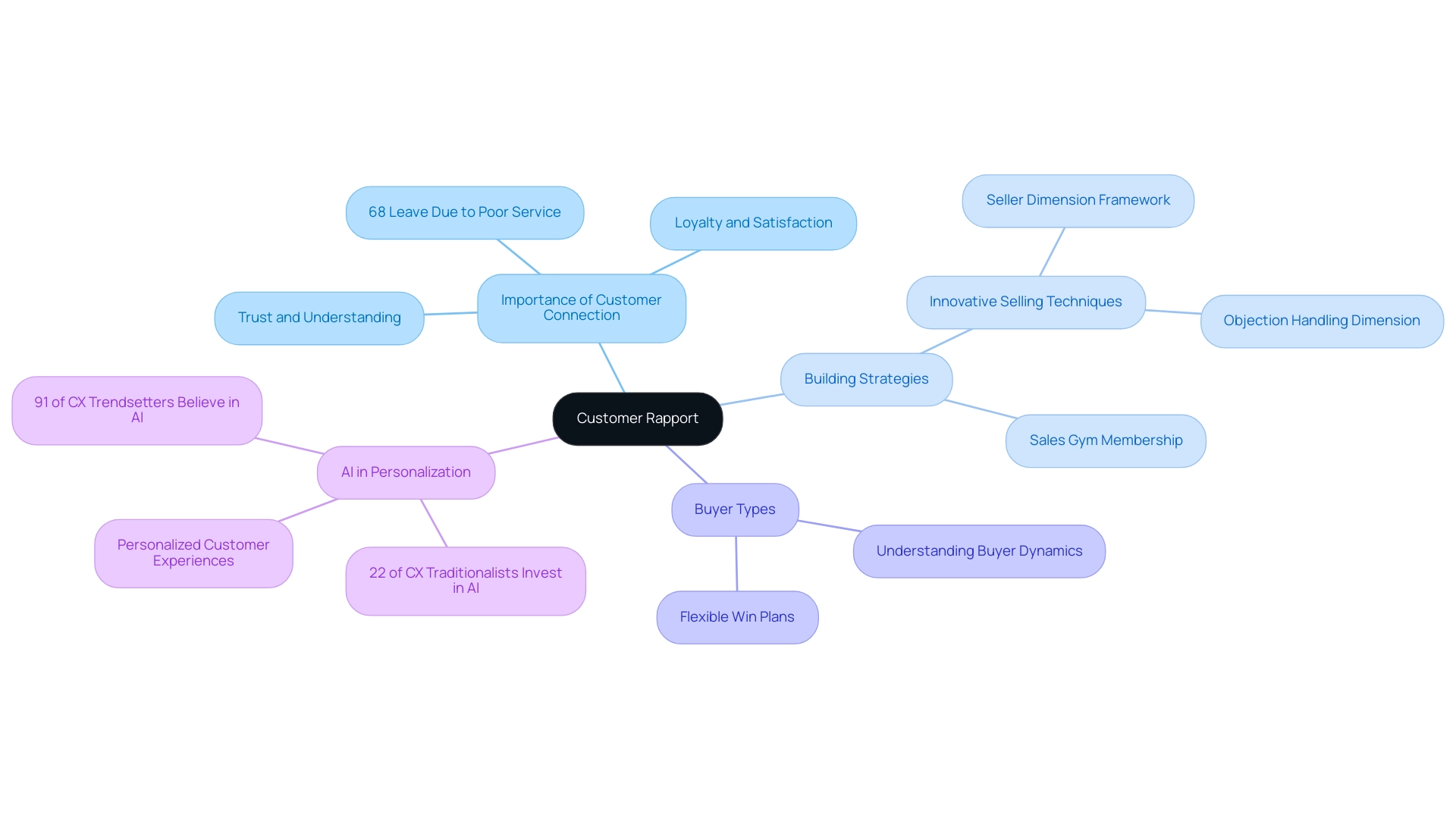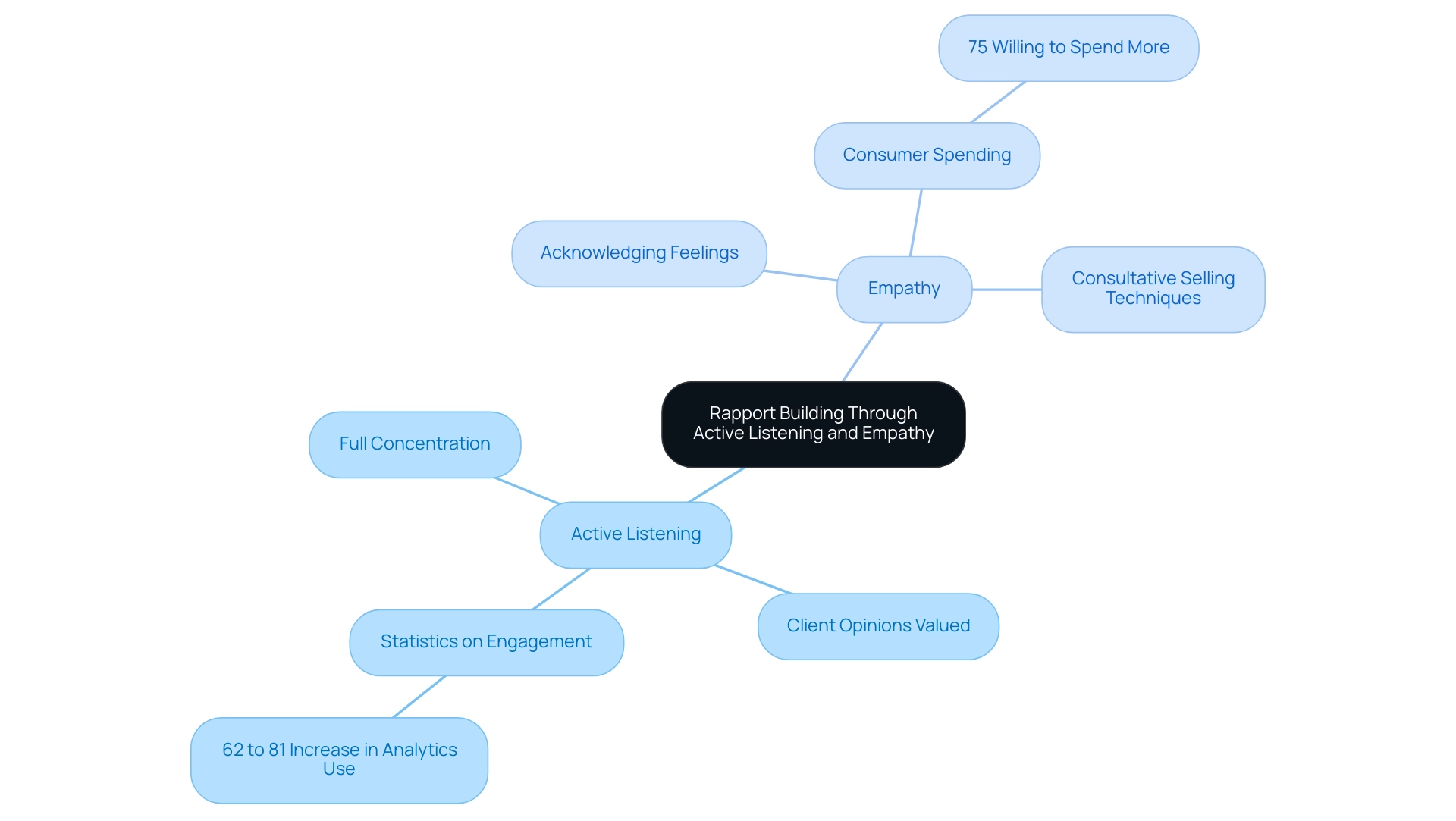
This article delves into the critical importance and methodologies of establishing customer rapport, a cornerstone for cultivating trust, loyalty, and satisfaction in business relationships. It asserts that robust customer connections are pivotal, leading to enhanced retention rates, increased revenues, and a favorable brand reputation. To this end, the article underscores the necessity of implementing effective strategies such as:
These strategies are essential for enriching client interactions.
In the competitive landscape of modern business, the significance of customer rapport has never been more pronounced. Establishing a strong emotional connection with clients is not merely a nicety; it is a fundamental driver of loyalty, retention, and overall business success. As organizations navigate the complexities of customer expectations, the ability to foster trust and understanding becomes paramount.
With statistics revealing that a staggering 68% of customers depart due to poor service, the imperative to cultivate meaningful relationships is clear. Innovative sales methodologies and frameworks, such as those offered by Magical Selling, empower businesses to tailor their approaches, ensuring that customer interactions are not only effective but also resonate on a personal level.
By delving into the techniques that enhance rapport, businesses can transform customer experiences into lasting partnerships. This ultimately paves the way for sustainable growth and advocacy in an ever-evolving market.
Customer connection serves as the bedrock of successful professional relationships, characterized by trust, understanding, and mutual respect. Building customer rapport is essential, as it fosters open communication, nurtures loyalty, and significantly enhances overall satisfaction. When clients experience a genuine connection with a brand, they are not only more inclined to return but also to recommend the business to others, thereby amplifying its reach and reputation.
The emotional bond established through effective customer rapport-building strategies can profoundly impact perceptions. A striking statistic reveals that 68% of clients leave a company due to inadequate service, underscoring the necessity of nurturing these relationships. Organizations that prioritize connection not only mitigate the risk of losing clients but also reap substantial advantages; robust relationships can lead to enhanced loyalty and retention rates, which are vital for sustainable growth.
As we approach 2025, the integration of innovative selling techniques, such as those offered by Magical Selling, becomes increasingly critical. Companies that utilize tailored frameworks for deal creation, progression, and closing are better equipped for customer rapport building, as they understand and respond to client needs effectively. For instance, the Seller Dimension framework provides essential tools for teams to enhance their capabilities and adapt to evolving market challenges, ensuring that interactions are both effective and personalized.
Furthermore, the Sales Gym membership offers valuable resources and training for business development and presales team members, further bolstering their ability to build rapport.
Understanding the four buyer types outlined in Magical Selling's Deal Dimension framework allows professionals to customize their approaches, thereby enhancing the effectiveness of their customer rapport-building efforts. By categorizing purchasers based on their competencies, teams can develop flexible win plans that address specific client needs and objections, fostering a deeper connection.
Moreover, the capacity to categorize objections into three main types, as highlighted in the Objection Handling Dimension, equips sellers with the tactical agility necessary to navigate client concerns adeptly. This expertise not only enhances customer rapport building but also establishes trust, transforming the selling process into a consultative experience that prioritizes the buyer's needs. The Heart of the Deal Method and the Problem Statement Method are essential frameworks that can assist sales teams in crafting engaging narratives and effectively addressing client pain points.
Successful examples of relationship building are evident in organizations that actively invest in artificial intelligence (AI) for personalization. A notable case study reveals that 91% of CX Trendsetters believe AI can effectively personalize experiences, while only 22% of CX Traditionalists are making similar investments. This divide indicates that those embracing AI are likely to excel in delivering personalized experiences, further strengthening their client relationships.
By leveraging AI, companies can cultivate more meaningful interactions that resonate with clients, reinforcing the significance of strong relationships.
Ultimately, the importance of customer rapport building cannot be overstated. It serves as a crucial factor in loyalty and satisfaction, influencing how individuals perceive a brand and their inclination to remain loyal. By focusing on establishing robust connections through innovative sales techniques and understanding buyer dynamics, organizations can cultivate a loyal clientele that not only returns but also champions the brand, ensuring long-term success.

Establishing strong relationships with clients yields numerous advantages essential for success in 2025:
Investing in client relationships not only enhances satisfaction but also drives growth through loyalty and referrals. As Salesforce discovered, 84% of clients prefer to be treated as individuals rather than numbers, highlighting the importance of customer rapport building through personalized interactions that nurture lasting relationships. By leveraging data-driven insights and transformative sales solutions, such as those provided by Magical Selling, businesses can further enhance their client relationships and ensure they meet the evolving expectations of their clients.

To effectively build rapport with customers and enhance your consultative selling approach, consider implementing the following techniques:
Incorporate these techniques into your daily interactions to promote customer rapport building and foster stronger connections with customers. By concentrating on active listening and personalization, you can create a client-centric atmosphere that not only meets but surpasses expectations, ultimately fostering customer rapport building and loyalty.
Research indicates that 41% of customer-obsessed companies achieved at least 10% revenue growth in their last fiscal year, highlighting the importance of customer rapport building and its impact on business success. As Sam Walton famously stated, "There is only one boss. The client. And he can fire everybody in the company from the chairman on down, simply by spending his money somewhere else." This emphasizes the importance of customer-centric strategies in customer rapport building.
Additionally, the case study titled "Why AmplifAI?" demonstrates how effective data management and performance enhancement can connect to establishing client relationships, offering a real-world example of successful implementation. Furthermore, Magical Selling's services, such as the Sales Bond Academy, can help sales professionals develop techniques for customer rapport building, ensuring they are well-equipped to foster strong client relationships.
In consultative selling, remember to sell the problem first and then the solution. When you provide proof, ensure it is substantial and not just 'word salad' or 'Sales talk,' as many sellers inadvertently try to do.

The absence of strong rapport with customers can lead to a cascade of detrimental effects that significantly impact business performance:
The implications of lacking customer rapport building extend beyond immediate sales losses; they can fundamentally alter the trajectory of a business. Companies that fail to establish meaningful connections with their clients may struggle to maintain market share in an increasingly competitive landscape. As client onboarding becomes a pivotal aspect of client experience strategies in 2025, customer rapport building from the outset is essential for long-term satisfaction and loyalty.
Moreover, the ethical considerations of client service are gaining traction. Brands that openly convey their values and show a commitment to sustainability, such as Patagonia, are establishing new benchmarks for audience engagement. This trend emphasizes the significance of aligning business practices with client expectations, further strengthening the need for strong relationships.
In summary, the consequences of lacking customer rapport building with clients are profound, affecting everything from retention to brand reputation. As Justin Bonar-Bridges, a Support Technician Level II, notes, 'The most important service skill is empathy.' When our clients experience issues, being able to authentically acknowledge those elevated emotions helps individuals feel seen and heard, which not only paves the way forward for a resolution but also enhances customer rapport building; investing in these relationships is not just beneficial, it is essential for sustainable success.
Moreover, with 56% of CX Trendsetters actively investing in AI to tailor experiences, businesses must adjust to these trends to improve relationships and satisfaction.

Active listening and empathy are essential elements in building customer rapport, significantly impacting client retention and satisfaction.
By prioritizing active listening and empathy, alongside a keen understanding of buyer competence and consultative selling methods, professionals can focus on customer rapport building to forge lasting connections with clients, ultimately enhancing satisfaction and loyalty.

Mastering customer rapport yields substantial long-term advantages that can transform a business's trajectory:
Investing in customer rapport building strategies not only enhances immediate sales but also ensures long-term success, reinforcing the idea that the client is indeed the boss, as famously stated by Sam Walton: 'There is only one boss. The client. And he can fire everybody in the company from the chairman on down, simply by spending his money somewhere else.'
By prioritizing client relationships and leveraging innovative training and systems, organizations can unlock the full potential of lifetime value and ensure sustainable growth. Additionally, with 40% of businesses planning to expand their use of AI in customer service over the next year, it is clear that adapting to current trends in rapport-building strategies is essential for future success.

Establishing and nurturing customer rapport is essential for thriving in today's competitive business environment. Strong relationships built on trust and understanding not only enhance customer satisfaction but also drive loyalty and retention. With a staggering 68% of customers leaving due to poor service, it is evident that businesses must prioritize these connections to mitigate churn and foster long-term partnerships.
Effective techniques such as active listening, personalization, and empathy play a critical role in rapport building. By genuinely engaging with customers and tailoring interactions to their unique needs, organizations can create meaningful experiences that resonate deeply. Moreover, leveraging innovative sales methodologies, like those offered by Magical Selling, empowers sales teams to adapt and respond to customer dynamics, reinforcing the emotional connections that lead to brand advocacy.
The benefits of mastering customer rapport extend far beyond immediate sales; they encompass increased customer lifetime value, stronger brand advocacy, and resilience in the face of market fluctuations. As businesses invest in these relationships, they position themselves for sustainable growth and success. In an era where customers increasingly seek personalized experiences and ethical practices, the commitment to building rapport has never been more vital. Embracing these strategies not only meets evolving customer expectations but also secures a competitive edge that can propel organizations towards lasting success.
Why is customer connection important for professional relationships?
Customer connection is crucial as it fosters trust, understanding, and mutual respect, leading to open communication, loyalty, and enhanced overall satisfaction.
What are the benefits of building customer rapport?
Building customer rapport leads to increased client loyalty, higher satisfaction, positive word-of-mouth, valuable feedback for improvement, and alignment with ethical values, all of which are essential for business success.
What percentage of clients leave a company due to inadequate service?
A striking 68% of clients leave a company because of inadequate service, highlighting the importance of nurturing customer relationships.
How can innovative selling techniques enhance customer rapport?
Innovative selling techniques, such as those offered by Magical Selling, provide tailored frameworks for deal creation and progression, allowing companies to better understand and respond to client needs, thereby enhancing rapport.
What is the Seller Dimension framework?
The Seller Dimension framework offers essential tools for sales teams to enhance their capabilities and adapt to market challenges, ensuring personalized and effective interactions with clients.
How can understanding buyer types improve customer rapport?
By categorizing buyers based on their competencies using the Deal Dimension framework, professionals can customize their approaches and develop flexible win plans that address specific client needs, fostering deeper connections.
What are the three main types of objections in sales, and why are they important?
The three main types of objections help sellers navigate client concerns effectively. Understanding these objections enhances customer rapport and establishes trust, transforming the selling process into a consultative experience.
How does artificial intelligence (AI) contribute to customer rapport building?
AI helps personalize customer experiences, as evidenced by 91% of CX Trendsetters believing in its effectiveness. Companies that leverage AI can create more meaningful interactions, reinforcing strong client relationships.
What impact does strong client loyalty have on business revenues?
Loyal clients tend to spend more and are more receptive to upselling and cross-selling opportunities, which can significantly enhance a business's revenue streams.
How can strong customer relationships lead to positive word-of-mouth?
Satisfied clients are more likely to share their positive experiences, which can attract new customers. Over 50% of consumers are willing to change brands after a negative encounter, making positive relationships crucial for retention.
What role does feedback play in improving business practices?
Strong relationships encourage clients to provide honest feedback, which is essential for business improvement. Companies that effectively gather and act on this feedback can enhance their reputation and client satisfaction.
How can aligning with ethical values enhance brand loyalty?
As consumers become more concerned about ethical practices, integrating sustainability into services can resonate with them, strengthening brand loyalty. Brands like Patagonia exemplify this alignment.
What is the significance of treating clients as individuals?
Treating clients as individuals rather than numbers is important, as 84% of clients prefer personalized interactions, which nurture lasting relationships and enhance overall satisfaction.